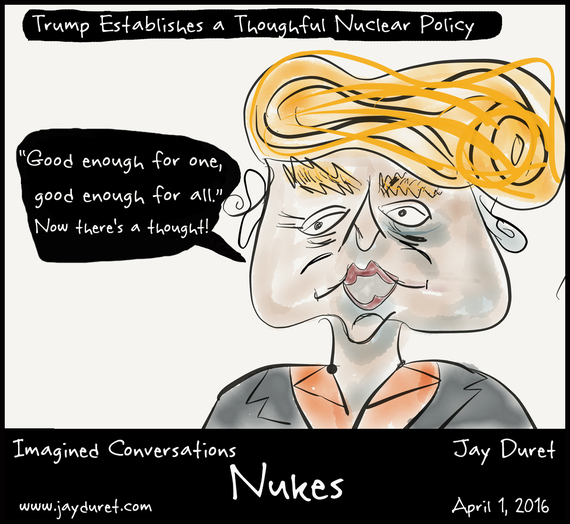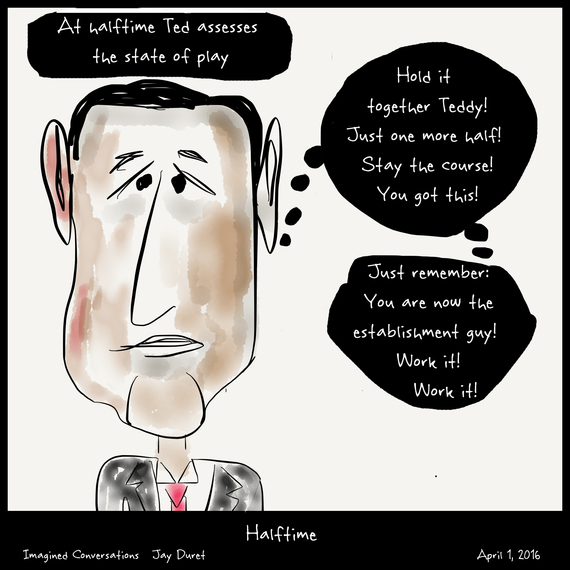This weekend marks the halfway point in the presidential primary season. It began with the Iowa caucuses on February 1st and ends when California and four other states weigh in on June 7th, when one-eighth of the total number of delegates will be awarded. In most presidential years, states clamor to move to the front to the pack, where Iowa and New Hampshire garner all the media attention and seem to be the most important states in the nominating process. But this time around states at the end might turn out to be the pivotal ones. Two weeks ago, Hillary Clinton and Donald Trump seemed on the verge of locking up their respective party nominations, but now appears that we may not going to know who the winners are until all the voters have had a chance to weigh in, or even until the party conventions in July.
At the halfway point in the primary season, both political parties are in uncharted territory. Four of the five remaining candidates have significant flaws. Donald Trump's negatives are off the charts. Based upon the most recent Bloomberg Politics poll, he is viewed unfavorably by 68% of the national electorate, against favorable rating of 29%. Ted Cruz is not far behind, with an unfavorable/favorable rating of 55% to 32%. On the Democrat side, Hillary Clinton's failure to put away a 74 year-old socialist Jew from Vermont is manifest in her own unfavorable/favorable rating of 53% to 44%, in contrast with Bernie Sanders' standing as the only remaining candidate viewed positively by the American electorate with ratings of 52% favorable vs. 41% unfavorable.
After putting together a winning streak, winning or tying six primaries in a row in mid-March, Hillary has lost the last five contests, and now looks to be pummeled by Bernie Sanders in Wisconsin this Tuesday. The polling there is ominous. According to the most recent Fox Business poll of Wisconsin voters, Sanders leads Clinton by almost 50 points among voters 45 years old and younger. She might remain the presumptive Democrat nominee, but her lead is getting smaller and smaller in the voted delegate column, and she knows better than anyone else that the Superdelegate count--where she holds a commanding lead--is ephemeral. She had the Superdelegates eight years ago. Until she didn't.
Part of Sanders' success rests on the simplicity of his message: the political and economic system is rigged in favor of the wealthy, and it is time that we did something about it. As the certainty of her winning the nomination has faded, Clinton has become increasingly tetchy in the face of Sanders' narrative that she has been corrupted by Wall Street and corporate money. But railing against Bernie's "lies" as she did this week will only exacerbate her problem. The simple truth is that luring big money has been an essential element of Clintonism--think Johnny Chung, Mark Rich and the Lincoln Bedroom--and Bill Clinton boasted that winning over Wall Street to the Democratic Party was a major success of his New Democrat movement, even if the price paid was Wall Street deregulation and the 2008 financial collapse. The money, for better or worse, is part of the Clinton brand.
It has become conventional wisdom to suggest that Hillary Clinton does best when her back is against the wall, but another way of saying that is that she does best when she is losing. Suffice it to say, that is a risky strategy. If she loses big in Wisconsin, and her poll numbers continue to erode in New York as they have been, by the end of the month her lead in the voted delegate count could shrink to the point where California will actually matter. And no one should be fooled by the notion that the Superdelegates provide a buffer. At the end of the day, it will be next to impossible for Hillary to win the nomination if she loses the voted delegate count. It would be just too un-democratic.
At the midpoint in a movie script, the plot takes a major turn, and this appears to be the case as we reach the halfway point in the Republican race. For the better part of the past year, it has become a routine media riff to predict why the [fill in the blank] comment by Donald Trump will be his undoing. He insulted Megan Kelly. He insulted John McCain. He insulted Mexico. He insulted the entire Muslim world. Yet time and time again, the New York businessman turned reality TV star proved his resilience as his poll numbers rose each time the media predicted his demise.
But the man who has single handedly turned an entire primary season into a reality show may have finally succumbed to reality. This week, he may have finally done it. He may have finally made enough missteps that even his loyal base may begin to see through the facade of a man who has no earthly business being President of the United States. First, he had an interview with the Washington Post. It was a banal non-event, and certainly nothing that on its own would have a material impact on the race. He said nothing that he had not said at his rallies. But that was the point. Given the chance to pivot, to begin to demonstrate in front of the mavens of modern journalism that he is a serious man, he could not rise to the occasion. Behind closed doors he doubled down on why it mattered what size his hands are. He could not say what he would do about ISIS, only that it was critically important that when faced with Marco Rubio's genitalia innuendo, he had to strike back.

Then there was an interview with the New York Times. Perhaps chastened by his performance days earlier with the Post, Trump stayed on message and his foreign policy answers were actually interesting. He makes a strong case for the value of strategic unpredictability in international affairs, but what was evident once again was that every response was off the cuff. Given the opportunity to demonstrate the sound gravitas of his realpolitik worldview, it was just Donald Trump, riffing with the media as he has been riffing for the past nine months.
Then it all came to a head in a town hall interview with Chris Matthews. Faced with the question from Matthews as to whether a woman who has an abortion should be punished in the event that abortion was made illegal, Donald Trump looked visibly perplexed. He stumbled for an answer, before finally concluding that if abortion is murder, the woman who conspires in that murder must face punishment. It was not the successive days of cleaning up his answer that was notable, but rather the fact that after nearly a year running for president, as in his interviews with the Post and the Times, Donald Trump was still making up his answers as he went along.
Over the past week, the price of Trump's lazy, extemporaneous approach to politics started to become more tangible. The Republican primary season has been a riveting reality show, and as such it should have been no surprise that a reality star might excel at the give and take, the punch and counterpunch. But the truth is that the primary season that we follow every day is just one step in how the delegate selection process works. There are, as it turns out, each state holds its own convention, or similar process, to select the actual delegates that will attend the national party conventions, and each of these delegates are individuals whose political views and commitments may not reflect the will of the primary or caucus voters in that state. But even more to the point, the Democratic and Republican Parties are private organizations that make their own rules, and as in any game, the rules are important.
Last week, Ted Cruz schooled Donald Trump on the real world of Republican Party politics. Trump won the Louisiana primary back on March 5th, but last week Cruz emerged from the Louisiana delegate selection process with the largest share of the actual delegates. Perhaps most important, Cruz won five of the six seats assigned to Louisiana on the important rules committee for the national convention. Each state, as it turns out, has its own convention and own rules around delegate selection. Delegates who may be bound to Trump on the first ballot will quickly abandon him on subsequent ballots. And, perhaps most important, the rules will not be established until the first days of the convention, by a rules committee to be determined through actions at each state convention, and unsullied by the results of the primaries and caucuses earlier on in the process.
And it gets worse. This week, in the face of a concerted "No Trump" backlash, Donald Trump appeared to retreat from his vow to support the ultimate Republican nominee, if it is not him. Trump's words threw into doubt the status of the 50 delegates Trump won when he swept the South Carolina primary in February. South Carolina rules require a party loyalty pledge and Trump's petulance could cost him those critical 50 delegates and move his first ballot delegate count in the wrong direction.
At the midpoint in this saga, Donald Trump appears to be suffering what could be a cataclysmic reversal, one that could rewrite the direction of a drama that has kept us glued for so many months. The reversals in delegate commitments that Trump has experienced were not accidental. The campaigns that are being run by Ted Cruz and Donald Trump are complete opposites. Ted Cruz is a dedicated and cunning politician who understands that victory in politics is about blocking and tackling. It is more about work that goes on behind the scenes involving thousands of people than it is how one man performs in front of a camera. The Cruz team, led by Political Director Mark Campbell, has spent more than a year paying painstaking detail to the rules of the game in every state and the critical players in every county. They know exactly what they are doing, and they know that Donald Trump does not.

The irony is that Donald Trump is supposed to be the businessman. It is the cornerstone of his campaign narrative. He will fix America, he will make America great again, because he can set goals, define a strategy, build a team and execute a plan--in short do all those things that people in business do that people in government do not. But this week it has all been laid bare. As it turns out, there is no strategy. There is no team. And there is no plan. There is just Donald Trump, riffing away as the cameras roll. And as we learned this week, the more serious the issues get, the more specific the questions, the more he is adrift.
Time will tell if Trump can recover, one more time, and, perhaps more important, if he has the potential to be more than he has demonstrated to date. But we have reached the midpoint in the script, and this is where the protagonist is supposed to suffer a reversal, and on the Republican side it appears that he has.
For both the Democrats and Republicans, Wisconsin will be a pivotal day. As we pass the halfway point, both party frontrunners are struggling to sustain their advantage, both are vulnerable. As much as people have been girding themselves for a Clinton vs. Trump matchup--in particular the candidates themselves--it is still possible that the candidates in the fall will be Bernie Sanders and Ted Cruz. That would be an unbelievable outcome. Unbelievable, but not beyond the realm of possibility.
Artwork by Jay Duret. Find him at jayduret.com.
